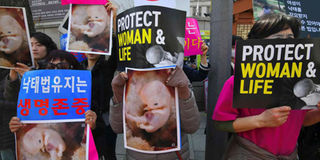Health lobbies condemn anti-abortion billboards

South Korean pro-lifers hold placards showing images of embryos during a rally supporting an abortion ban outside the constitutional court in Seoul on April 11, 2019. Health groups in Kenyan have condemned anti-abortion billboards erected in Nairobi. PHOTO | JUNG YEON-JE | AFP
What you need to know:
- The health lobbies want the government to give support to women and girls seeking abortion services within the confines of the law.
- They also want the government to disseminate accurate accurate information on abortion and access to abortion services to the public.
- In addition, the groups says the government should also engage communities through faith-based organisations.
A coalition of civil society organisations (CSOs) has called on the government to give support and protection to women and girls seeking abortion services.
The CSOs have particularly taken an issue with billboards erected in parts of Nairobi that portray abortion as murder and argue such blanket condemnation may lead to violation of women’s reproductive health rights.
“We …condemn the billboards in question and the message contained in them for seeking to shame women without providing the necessary context and public health reality of what these services provide; and for seeking to shame women without acknowledging that even in a restrictive legal framework abortion is a health service,” the CSOs said in a statement.
The 11 health organisations said that seven women and girls die daily from unsafe abortion in Kenya yet those deaths are preventable.
The groups agitating for government support are: Center for Reproductive Rights, Federation of Women Lawyers, Trust for Indigenous Culture and Heath, Network for Adolescent and Youth of Africa, Red Tape, Ipas- Health Access Rights, Right Here Right Now, Kelin, Xhale Africa, Women’s Link Worldwide, and Reproductive Health Network Kenya.
According to research published in The Lancet in 2017, in many African countries, less than 15 percent of procedures to terminate pregnancy met minimum medical standards.
The highest proportions of safe abortions were seen in countries with less restrictive laws, high economic development and well developed infrastructures," said lead author Bela Ganatra, a researcher at the World Health Organization in Geneva.
A study by the African Population and Health Research Centre and the Ministry of Health between 2012 and 2016 found that Kenya used more than Sh500 million tackling unsafe abortion cases.
The report, The Costs of Treating Unsafe Abortion Complications in Public Health Facilities in Kenya, noted that this is an increase of nearly 24 percent, compared with Sh433 million in 2012.
The CSOs want the government to ensure that there is an environment that allows women to access abortion services by enacting and implementing laws and guidelines that will provide clarity to health providers and women and girls on when to offer abortion services.
The groups also want the government to proactively disseminate accurate information on abortion and access to abortion services to the public and address abortion stigma by engaging communities, including through faith-based organisations.
“Consequently, women and girls may seek abortion services when they have suffered a miscarriage, when they have an ectopic pregnancy, when the fetus cannot survive outside the mother’s womb and when they suffer sexual violence,” the CSOs said.




